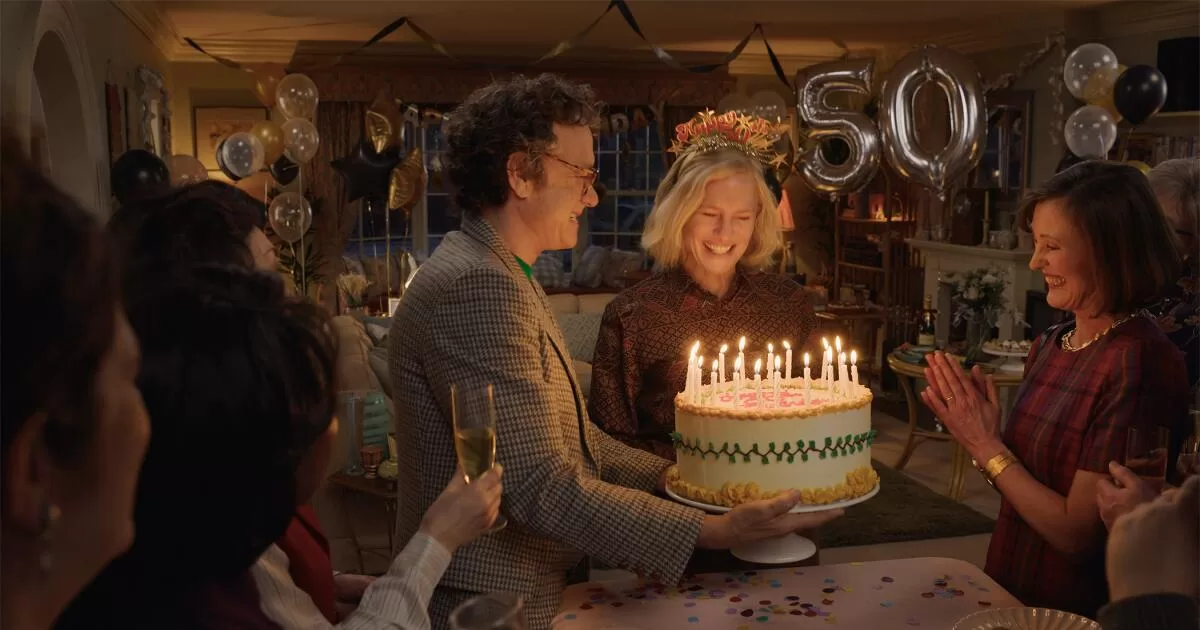Lately, filmmaker Robert Zemeckis has been a somewhat confounding figure. The director of such beloved movies as the “Back to the Future” series, “Forrest Gump,” “Cast Away,” “Death Becomes Her” and “Who Framed Roger Rabbit” has delivered almost as many duds as hits, if you also take in “The Polar Express,” “Beowulf,” “Welcome to Marwen” and “Pinocchio.” An experimenter obsessed with special effects and the dramatic power they can exert in cinema, Zemeckis is always trying something new, especially with motion-capture technology. It doesn’t always work: Many of these projects drift into an unappealing uncanny valley. Despite his several attempts, he hasn’t quite nailed it yet.
In his new intergenerational family drama “Here,” based on a 2014 graphic novel by Richard McGuire (expanded from a six-page comic strip published in the comics anthology “Raw” in 1989), the experiment is the narrative itself, a family history spanning generations — and centuries — all told from one fixed point of view. In his formally inventive graphic novel, McGuire used frames within frames to visually represent different time periods within one panel.
Zemeckis maintains the frames-within-frames conceit as a transitional flourish in the film version of “Here,” but the plot itself is more about jumping around in time while maintaining the stationary camera. There are many inhabitants of this space, from a Native American couple (Joel Oulette and Dannie McCallum) in pre-Columbian times, to a young family in the Victorian era (Michelle Dockery and Gwilym Lee) who move into their modest Colonial home, and then later, the inventor of the La-Z-Boy recliner (David Fynn) and his ebullient wife (Ophelia Lovibond), who take the home. There’s also a present-day Black family (Nicholas Pinnock, Nikki Amuka-Bird and Cache Vanderpuye) navigating the COVID-19 pandemic and the Black Lives Matter movement.
But the story focuses predominantly on a family that occupies the house for most of the 20th century: a World War II veteran, Al (Paul Bettany), his wife, Rose (Kelly Reilly) and then their son Richard (Tom Hanks) and his wife, Margaret (Robin Wright). And yes, Hanks and Wright have been digitally de-aged — we see them for the first time as teens — and no, it does not work at all (there’s something very strange happening around Hanks’ de-aged mouth). Sure, the Hanks, Wright and Zemeckis trio supplies the gimmick of a “Forrest Gump” reunion, but why do we have to de-age Hanks when there are his real-life sons Colin and Truman at home? Even Wright has a look-alike actor daughter, Dylan Penn.
“Here” also has that Gumpian quality of major historical events lining up with personal stories: Benjamin Franklin (Keith Bartlett) and his son William (Daniel Betts) occupy the Colonial manor across the street; a pregnancy is announced as the Beatles take the stage on “The Ed Sullivan Show”; and seemingly everything relevant happens in this godforsaken living room, including weddings, births and breakups.
The story of “Here” surrounding Richard and Margaret is relatable, entirely predictable and utterly dull. They get pregnant as teens, move in with his family, he gives up art to get a real job, she wants her own space, etc.. Ostensibly, their story is about navigating the ups and downs of life, but ultimately it turns into a rather dispiriting tale about two people taking too long to pursue the things that make them happy, and for her, it’s getting out of that damn house, though if she ever left, there would be no “Here” here.
Changing hands over the years means real estate agents coming in and out throughout the film, and by the time the credits roll, you half expect the logo for a home insurance company to come up, because that’s what this whisper of a film feels like: a commercial for homeowners insurance. To be frank, there are 30-second spots that have inspired more tears and emotion than the flat, pointless “Here.”
Richard and Margaret’s daughter Vanessa (Zsa Zsa Zemeckis) disappears around age 16 and never reappears again, which is a shame, because the more interesting story isn’t the parents’ baby boomer tale, but perhaps how their Gen-X daughter or zoomer grandchildren might benefit from their generational wealth. “Here” doesn’t want to dig into any of the nuances surrounding that. But perhaps property values are just where the mind wanders when the story playing out is so treacly and stale.
This year has seen other daring projects from aging filmmakers who have experimented with cinematic form and function on their own terms — including Francis Ford Coppola’s “Megalopolis,” and Kevin Costner’s “Horizon.” While the efforts have been laudable, unfortunately, the results have all been flops and “Here” is no exception.
Katie Walsh is a Tribune News Service film critic.
‘Here’
Rated: PG-13, for thematic material, some suggestive material, brief strong language and smoking
Running time: 1 hour, 44 minutes
Playing: In wide release Friday, Nov. 1
